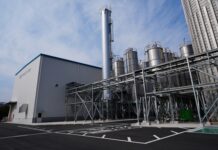A World Class Platform to Address the Water-Energy Nexus
For four days next January, thought-leaders, policy makers and technologists from the global water industry will once again convene in the UAE capital, Abu Dhabi, for the third edition of the International Water Summit (IWS).
At a time of rising global populations and diminishing water resources, the need for actionable solutions to unlock the water-energy nexus and ensure global water security has never been greater.
IWS is a platform that seeks to address that challenge. From next generation, cutting-edge technologies that enhance resource management and efficiency, to investment capital and policy reform, IWS illuminates the key global water industry issues, offering a holistic view of the challenges and opportunities faced.
Hosted by Masdar in partnership with Abu Dhabi Water and Electricity Authority (ADWEA), the 2015 IWS edition will again form a key element of Abu Dhabi Sustainability Week – the largest gathering of its kind in the Middle East and North Africa (MENA) region.
IWS comes at a time when there is a need to increase desalination capacity to more than 5,000 million gallons a day to meet projected regional demand – primarily from the energy and food industries. Last year, GCC nations committed US$32 billion to water and renewable energy projects. Further afield, more than US$12.5 billion of investment is earmarked for water projects across the MENA region in 2015 alone.
In fact, the current rapid rate of water depletion across MENA may see the region categorised as one with ‘physical water scarcity’ by 2030. With IWS taking place in parallel to WFES and EcoWaste, it offers a unique opportunity to explore the co-innovation taking place across the full sustainability value chain and capitalise on the vast commercial opportunities available across the region.
Michel Jarraud is Chair of UN Water – regular participants at IWS. With 2015 marking the end of the UN’s ‘decade for action on water scarcity’, the next edition of IWS offers a chance to reflect and consider the next steps.
Jarraud agreed that the event provided an opportune moment to address the complex nexus challenge.
“IWS offers a platform for policy and decision makers and stakeholders – practitioners, research institutes, the private sector, financers and business leaders – to meet, discuss pressing issues related to water, share experiences, exchange technologies and cooperate to meet the needs of sustainable development in the region,” he said.
“The IWS also offers a venue for addressing the complex question of shared water resources and help build the necessary cooperation among stakeholders and countries…The organisation of the IWS in the broader framework of the Abu Dhabi Sustainability Week and co-located with the World Future Energy Summit and the International Renewable Energy Conference is remarkable.”
IWS has confirmed that 70 global experts will participate in the event’s conference to be entitled ‘Promoting Water Sustainability in Arid Regions’. The event’s conference will also address:
• Water conservation and future water sustainability
• Strategic direction within the GCC
• Regional project investment
• Integrated water resource management
• Improving water re-use
• Use of water in energy and manufacturing industries
• Smart water technology and water network efficiency
• Energy efficient and clean technology desalination
• Used water treatment and water usage in commercial buildings
• The nexus of water and energy in food
With water at the heart of sustainability, the IWS demonstrates Abu Dhabi’s and the UAE’s regional leadership on these critically important issues.
The 2015 IWS will be held under the patronage of H.H. General Sheikh Mohammed bin Zayed Al Nahyan, Crown Prince of Abu Dhabi and Deputy Supreme Commander of the UAE Armed Forces. Hosted by Masdar and organized by Reed Exhibitions, the Summit will be endorsed by the UAE Ministry of Environment and Water, Abu Dhabi Water & Electricity Authority, the Environment Agency of Abu Dhabi, the Regulation and Supervision Bureau, and Abu Dhabi Sewerage Services Company.
IWS – Water & Energy Statistics
For box out or graphic
• 2.5 billion – people remain without access to sanitation
• 1.3 billion – the number of people across the world who lack access to electricity
• 768 million – estimated number of people who remain without access to improved water sources
• 55 per cent – the increase in global water demand expected by 2050
• 40 per cent – percentage of global population expected to be living with severe water stress by 2050
• 60 per cent – percentage of energy demand rises expected to come from China, India and Middle East
• US$300 billion – level of investment in GCC water sustainability projects between the period of 2012 – 2022
• 180 – the number of expected exhibitors
• 70 – the number of confirmed speakers






























